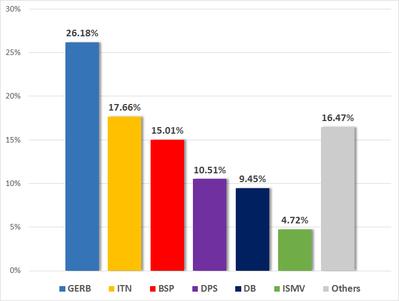On April 4 in Bulgaria’s parliamentary elections, 25% of voters supported Prime Minister Boyko Borissov’s right-wing party, GERB. But new parties that campaigned on anti-corruption and Covid denial also did extremely well. The left’s decline is disastrous.
The currently ruling GERB party received 26.18% in the elections for the 45th National Assembly. The party There Is Such a Nation came in second with 17.66% followed by the Bulgarian Socialist Party (BSP) with 15.01%. The Movement for Rights and Freedoms (DPS) finished fourth with 10.5%, that is slightly ahead of Democratic Bulgaria, which received 9.45%. The most recent formation to gain a seat in the new parliament is Stand up! Mafia out!, which got 4.72%.
GERB lost about seven percentage points in comparison to the previous election (33,54 percent or 1,147,292 votes in 2017 as against 26,18 percent or 837,797 votes 2021). The BSP suffered an even greater setback. Four years ago, the party received 27.93%. Now, the result was only 15%. Despite being in opposition for ‘four years and despite the government’s obvious blunders, corruption, and scandals, the ‘socialist’ party has lost twice as many votes as the ruling party. And this despite massive, nearly six-month-long protests. As absurd and contradictory as it may appear, this development needs to be understood.
Results 4 April 2021

What proportion of eligible voters supported GERB and what proportion voted for the parties who claimed to be the alternative? Or why the perception that the obtained result lacks sufficient legitimacy has some basis in the data.
One of the most serious problems in Bulgaria’s electoral process, low representation, was exacerbated by the recent parliamentary elections. Borissov delivered one of his usual bizarre monologues shortly after the polls closed, saying it was ‘quite ridiculous’ for parties with 5 or 9% of the vote to speak on behalf of the people, presumably referring to the ‘Stand Up! Mafia Out!’ and Democratic Bulgaria parties. He went on to say that even 25% was not much.
Source: Central Election Commission (Bulgarian), own compilation
This, however, is even more the case if we look at the actual representation of the parties entering the next parliament by looking at the votes case as a percentage of the total number of Bulgarian citizens eligible to vote.
Only 39.68% of Bulgarian citizens eligible to vote will be represented in the 45th National Assembly. GERB received 837,671 votes, which appears significant in comparison to the results of the other parties but only represents only 12.44% of all people with voting rights. By comparison, 16.78% of those eligible to vote supported GERB in 2017. In absolute terms, GERB lost about 310,000 votes.
Protests which changed nearly nothing
Last year’s protests clearly demonstrated a desire for change — roughly 60% of Bulgarians supported the demands as well as the protest itself. However, the hoped-for change was not implemented in the April 4 parliamentary elections. Only 22.25% of all voters supported the parties that declared themselves to be in opposition and entered parliament together.
The three new formations are known as ‘protest parties’ in Bulgaria: There Is Such a Nation, Democratic Bulgaria, and Stand up! Mafia out! They endorsed the protests. Slavi Trifonov, leader of There Is Such a Nation, popularised them through his television programme, which covered them live daily and mobilised people in the provinces. The other two are led by elected politicians in Bulgaria: Democratic Bulgaria and Stand Up! Mafia Out!, a new movement founded by former Ombudsman Maya Manolova. Although it is debatable, she is widely regarded as a person who helped social groups in need during her term as ombudsman, and this created momentum for her.
It should also be noted that some of the protest vote went to formations that remained below the entry threshold of four percent. Although its supporters actively participated in the protests, even if the other formations supporting the protests do not recognise the BSP as an alternative to the status quo – the three new elected formations received only 15.12% of eligible voters trust. Otherwise, over half a million Bulgarians (524,645) who casted ballots supported formations that fell short of the entry threshold and thus remained unrepresented in the National Assembly.
Electoral “normality” and BSP’s run to the bottom
Although low electoral participation is now by now accepted as normal, it nevertheless still means that most people do not trust the government’s decisions. Every move it makes is called into question, and there is a constant sense of ‘something rotten’ and wrong, even if this is not an objective fact.
The lack of legitimacy is understandable and is implied by the numbers themselves. When we feel such hostility toward those to whom elections delegate the power to make all important decisions for our common survival, a slew of issues arise — especially in times like these.
The left in Bulgaria is not offering anything fundamentally different or inspiring as a vision; there is simply no substance to run on. In addition, there is a general sense of apathy; there are no meaningful voices calling for massive mobilisation or struggle, let alone the formation of a new viable left, much less the creation of a new reality and departure from capitalism. The most ‘radical’ statements are rather mild social democratic positions, such as progressive taxation, reversing austerity, and so on. Some Bulgarian leftists have placed their hopes in the disastrous failure of the Bulgarian Socialist Party, a party that has long had an openly pro-business economic agenda as well as a conservative socio-cultural programme. It was surpassed by Slavi Trifonov’s strange movement There Is Such a Nation, a paraphrased of the title of one of his top songs ‘There is no such a state’, was recently formed and ran on constantly implying that the pandemic is a conspiracy or a fraud. This may be the beginning of the end of the BSP, as some hope; but as the Polish example demonstrates, it solves nothing. The Polish equivalent of the BSP, the Democratic Left Alliance, was out of parliament for some time, and the new social democratic party that emerged in the interim had to join forces with the DLA in order to achieve anything in the end.
The BSP’s disastrous results are, of course, the consequence of the same cancer that we can see all over Europe, based on the assumption that people would be fundamentally right-wing “at heart.” However, there is also the factor of the Socialist Party’s complete organizational implosion. One of BSP’s former members described it well:
“The BSP’s structures were very strong 20 to30 years ago. There was organszation as well as life! The community centres were packed for their meetings. An orchestra would perform, and a folklore singer would sing. People were happy, and there was life. Participants were 40 to 50 years old back then, and they are now 70 to80, with many who have died. The few who are still with us are infirm, and they do not always have an opportunity to vote. Structures are lacking, there is no longer any organisation, and connections are broken. […]
There are a few families that still have sympathy for the BSP, which I would call a conservative party, and this is passed down from generation to generation. And the party is naturally very limited. It has also moved very far away from socialist ideas, and in general now represents a sounding board for people who want power for reasons that are not entirely clear. BSP president Ninova’s problem is that she is widely despised, and even if she is elected for another 100 years, she will not add even 1 percent to the BSP’s current vote level. The collapse will continue. It’s unavoidable with her.”
Just as the first elections won by GERB and Boyko Borissov were the culmination of the growth of Bulgaria’s grotesque mafia-style capitalism, the election of Kornelia Ninova as the leader of the Socialist Party was the final manifestation of its degeneration, despite its being one of the continent’s oldest socialist parties.
The devastation continues.
